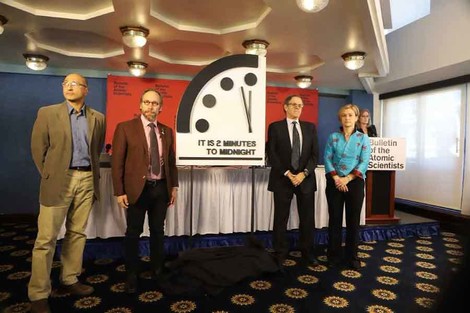Your podcast discovery platform
Curious minds select the most fascinating podcasts from around the world. Discover hand-piqd audio recommendations on your favorite topics.

piqer for: Globalization and politics Global finds
I am an Australian freelance journalist focussing on conflicts, politics, and warzones around the world. I have been working as a journalist for over 5 years, having reported from Australia, Germany, China, Egypt, Palestine, and Ukraine. I am especially interested in the way that new technologies are being used in conflict zones in unexpected and often disturbing ways. During my time working as a journalist, I also co-founded open-source war reporting site Conflict News.
Two Minutes To Midnight
At the height of the Cold War, societies lived in constant fear of imminent nuclear destruction and technological breakdown. The rhetoric of 'duck and cover' was taught to children from an early age, and bomb shelters were built within many public buildings. Now, these shelters sit abandoned and gather dust—relics of a more dangerous age.
Or is it that we are simply more complacent?
Last week, the Bulletin of the Atomic Scientists, who have run their Doomsday Clock for more than 60 years, gave a strong warning that catastrophe could be far closer than we like to think. For the first time since the 1960s, they moved the clock to '2 minutes to midnight', indicating that the risk of a civilisation-ending calamity was now the highest it has ever been.
To call the world nuclear situation dire is to understate the danger—and its immediacy.
In their reasoning for this, the scientists outline several key areas of concern. The most obvious and most dire was the situation on the Korean Peninsula, where leaders now routinely threaten each other with nuclear annihilation. As well, the growing tensions between the US and Russia, and the failure of nuclear disarmament talks were also seen as magnifiers of these risks. Less acutely, but also growing steadily, the threat of climate change also contributed to the Doomsday Clock moving forward, reflecting the lack of progress in stopping the collapse of Earth's environment. Finally, new technologies were seen to be disrupting global security in unprecedented ways, something which appears to be increasing conflict and division across all societies.
Given all of this, it is curious then that our society seems to view these developments with an ingrained sense of complacency. Few people take such warnings seriously, and rarely does it feature in political discussions.
Much like our own personal mortality, is the increasing vulnerability of human civilisation something we fear to explore?
